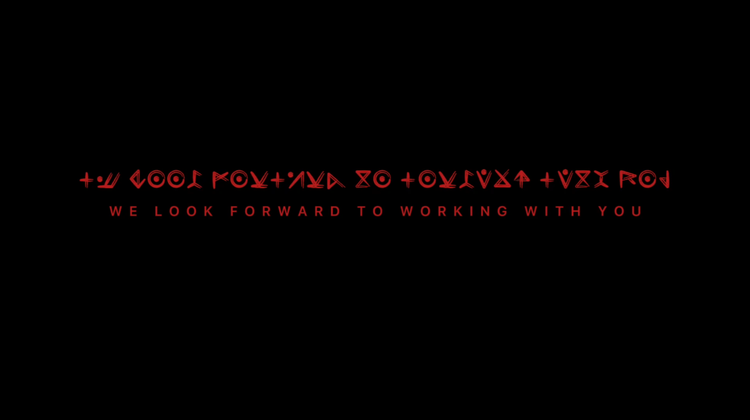Stories Made For Living
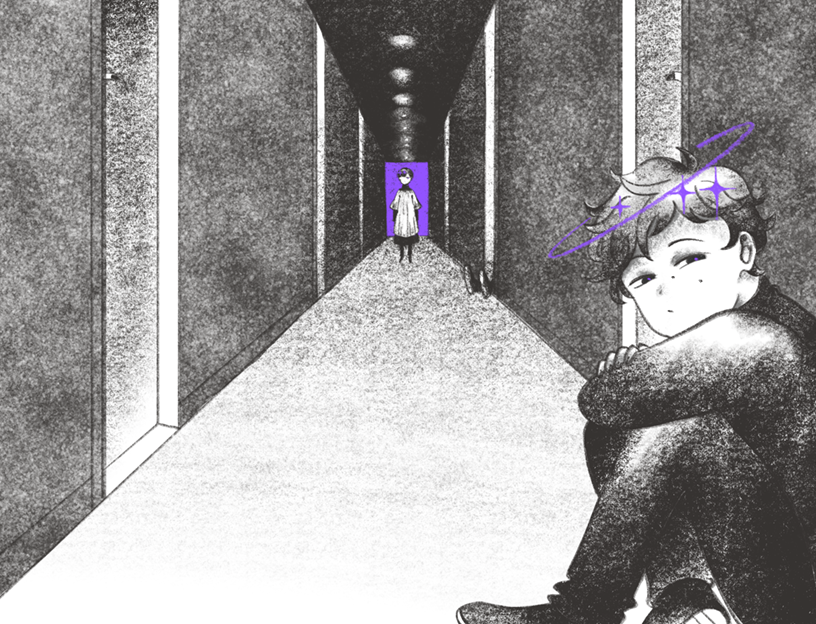
We tell stories to entertain. We tell stories to survive. We create stories to cope with uncomfortable realities, to give our actions purpose. Tomorrow Won’t Come for Those Without is about those stories we construct to rationalize our contradictions, the narratives that we tell to justify the violence inflicted to obtain peace.
As told by the epilogue, Tomorrow Won’t Come for Those Without takes place in a future where humanity is plagued by external psychodiseases, and in response has given up privacy and personal interpretations for “absolute narratives'' that present an objective record of events--the future given up for the security of the now.
Here creator Etherane takes humanity’s perspective, speaking to a glorious utopia where people have discarded their independence for the good of the collective. Tomorrow Won’t Come, however, presents a worldview that is anything but that. It’s layered in the personal, abstract and subjective, with ambiguous timelines and limited perspectives that obfuscate any concrete facts about its world. Every actor brings a claim to objectivity that’s immediately contradicted.
From the start we’re given an unreliable perspective, waking up in a hotel with our point of view character, Ori, and several instances of our deuteragonist, Rem, most deceased in some gruesome way. A solitary gate blocks their exit, declaring that “Tomorrow won’t come for those without a friend”, so Ori insistently recruits Rem to continue on. Each gate is followed by another, announced with variants of the titular phrase, and various Sunday School lessons that impart moral lessons through practical exams.
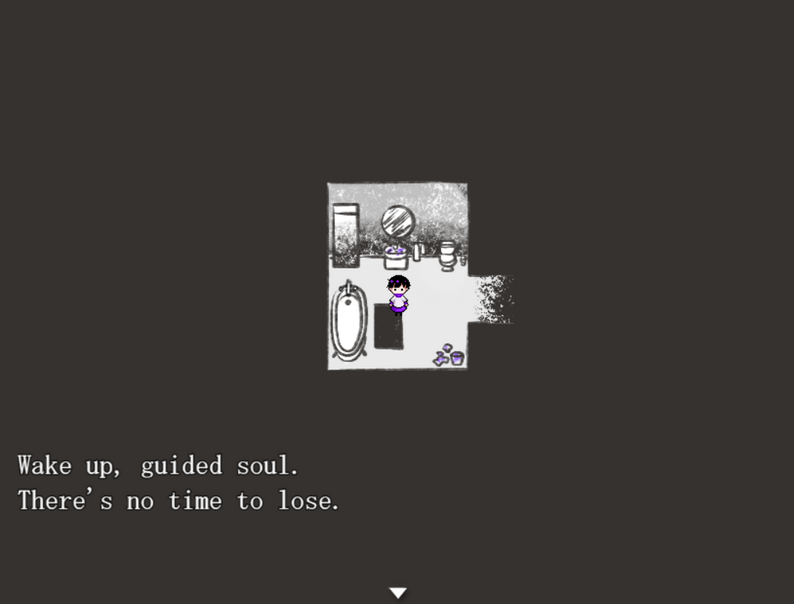
Rem plays skeptic to Ori’s acolyte, questioning his faith and the meaning of each of these lessons, pointing to contradictions in Ori’s own definitions. Ori’s responses embrace these contradictions, painting a picture of a fluid, self-repairing belief system.
Only when you’ve purchased and consumed enough Indulgences--vending machine items that absolve sins of various shapes--does Ori begin to reveal coherent motivations. These indulgences call to mind the Catholic Church’s practice of the same name, in which you could absolve or alleviate sin through material action, a practice that became the target of the Protestant Reformation, criticized for essentially forgiving any sin if the donation was large enough. Here Indulgences are presented at their most material extreme, literally commodified and sold through a vending machine, with sins reduced to various ambiguous, geometric categories with appropriate remedies.
Rem notes that the true function of these Indulgences is to invoke memories associated with regret, so it’s with a somber note that we’re given memories of Ori’s sister, Mari, when consuming an Indulgence. These flashbacks tell of a story of a monotonous existence that Ori and Mari would escape from, fleeing the Sunday School lessons to the Forest, where Mari would invent stories, playing the Narrator as Ori acted out the parts as the Hero. Over time his sister would become distant, seeming to become unsure of her own identity, until one day she declared that his sister no longer existed, that her body was no longer hers and in her place was an alien.
Notably, Mari uses the phrase “she can no longer write her Narrative” to imply that she is no longer in control, with the act of storytelling imparting agency that humanity has otherwise surrendered to their Rosaries, devices that impart the so called “absolute narratives” and look to for guidance.
Ori himself seems to surrender control of his narrative to others, first to his sister, the Narrator, and after to the Choir, in her absence. He seems satisfied to leave guiding his path to others. In the final flashback Mari returns to play one more game with him in the Forest, before his induction into the Choir, where she begs him to play ignorant to stay safe:
“Make everyone think you’re ignorant. Make them think you’re forgetful. Make them think you’re unable to think on your own.”
She makes him promise, declaring she’ll go as far as to join the Monastery so that he can always hear her voice.
It’s the first glimpse we get into the possibility that Ori is more than a naive follower. Many stories of faith and religion give a flat viewpoint, with faith either being a miraculous action that disproves all non-believers in the end or a cult the ignorant are indoctrinated into, dissolved by any rational thought.
Etherane presents the faithful as collaborators in religious narrative, as people who accept the inherent contradictions of faith to fulfill their needs. The faithful need faith as much as their faith needs them, the parishioners and parish weaving a narrative together. How much of Ori’s loyalty is a facade. Is his faith a theatrical one? Or have the lessons imparted on him taken greater root?
Each ending presents different truths, with differing motivations coming from the same desires. In both we’re given the reveal that Rem is a Celestial, one of those external psychodiseases given form. Celestials take root in the human psyche, seeming to feed on it until they become dominant. It’s suggested this is what happened to Mari, explaining the distance that grew between her and Ori.
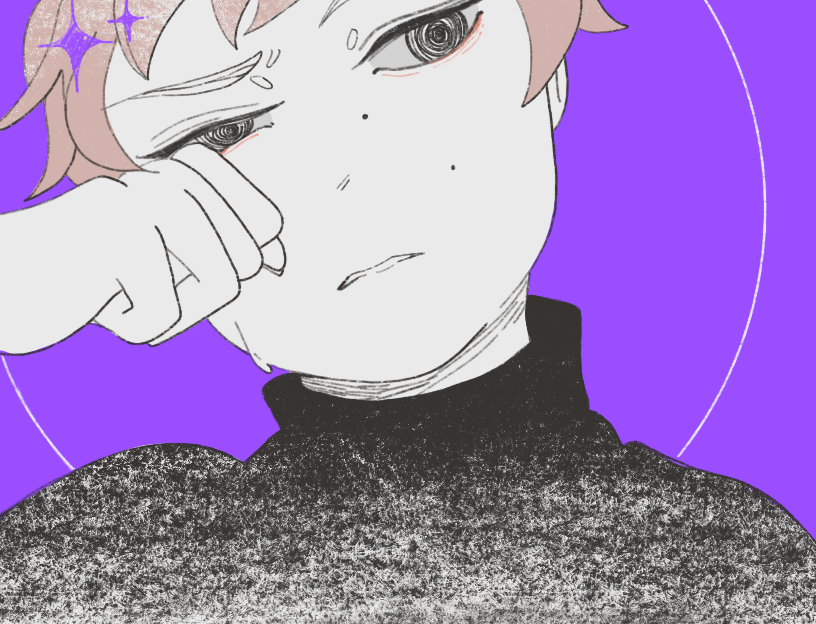
In the Silence ending we’re given a glimpse into Ori playing the fool, as he explains to a newly purified Rem that the cult like facade of the Choir serves as a facade that lures others in:
“Brainwashing, monotonous routines, oppressive doctrines--that’s how the Choir wants to be seen by others. As long as there are conspiracy theories, as long as there are people who think they’re being lied to, they’ll get creative in trying to prove their point.”
In the Static ending we see Ori’s first encounter with a Celestial, awed by their presence during their final moments before being purified. We finally see his motivations for joining the Choir, with him explicitly being aware of the Celestials as sentient beings, that their water was drugged to obfuscate that fact, to make their deaths palatable, to make their blood smell like lavender. Ori joins the Choir despite being aware of these deceptions, hoping only to see the beauty of the Celestials again.
For Ori, religion is a method to connect to others, and he’s willing to follow questionable doctrines in order to achieve that connection. In the Static ending we finally see Ori take control of his own narrative. He rejects his duty to wipe out Rem, and instead puts their connection before his connection to the Choir.
Ori is eventually swallowed by the mindscape of the hotel, with both him and Rem beginning to break down due to the instability his actions created. Rem recalls his host’s own faith in the system, before his human identity disintegrates, leaving him in his original alien form before reuniting with an injured Ori. Eventually they wake up, with Ori declaring Rem to be free of pollution, creating a lie that allows them to coexist, with the rest of humanity ignorant to them.
A number of perspective shifts occur throughout Tomorrow Won’t Come, and here we finally see the opposing doctrine of the Celestials, which claims its own form of objective reality. Celestials don’t lie. Celestials don’t dream. Celestials see the world in its material form. Even abstract ideas are simple truths to them. They don’t ask what love is--every emotion has its own color, and love is a violet word. Simple as that.
Yet we see through Rem’s perspective that this isn’t true. By living alongside, and within, humans, they’ve come to take on a human perspective. They’ve learned to imagine, to tell stories. Rem begins to take on the peculiarities of his host, and Mari’s affection towards Ori and affinity for storytelling persists long after she declares that Ori’s sister no longer exists. The Celestials’ concrete perspective of reality is eroded by living through human perspectives. They’ve become as polluted by humanity as humanity has been polluted by them.
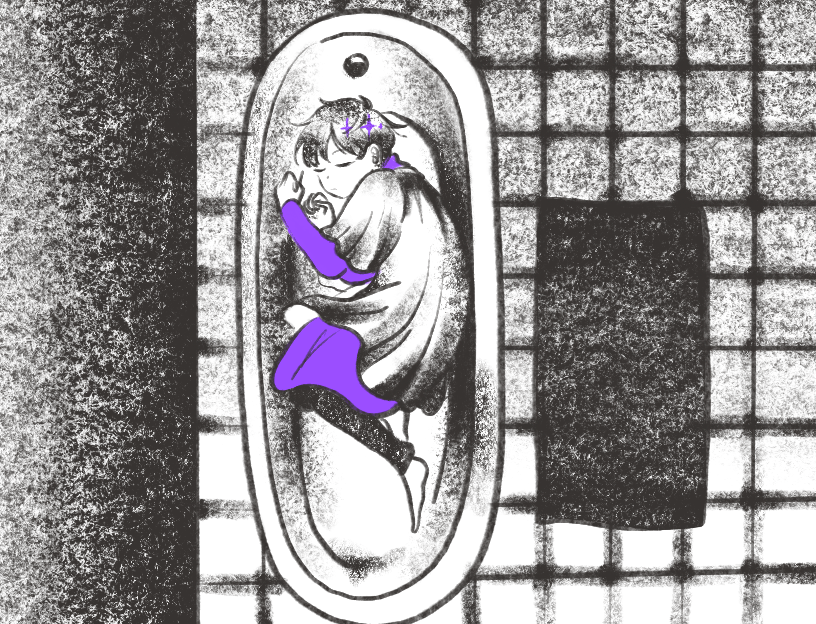
The lie that Ori and Rem tell together is the one that breaks down the lies that both species have been telling themselves to survive. It’s the story they tell together that finally allows each to write a new Narrative that breaks away from the template laid out for them.
There’s an almost apocalyptic tone to the ending. The final image shows Ori and Rem embracing, with Rem grown to towering proportions, captioned with “Only we would remember the lie that we told that day.” For at least these two, a sea change has come, and the worlds they used to inhabit can’t exist under the pressure of their love.



